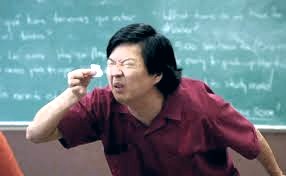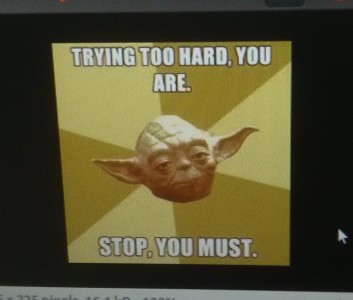When I first started studying vision improvement almost 20 years ago, firmly stuck behind my -10 hard contacts with a -1.75 astigmatism correction, I kept reading that I shouldn’t try to see. “What??!” I thought, completely puzzled. “How can I see if I don’t try?”. I believed I had to try hard to do anything at all, and I had to try even harder if it was something important.
For all of my life I had thrown myself fully into what I wanted to accomplish, whether it was academic or fitness-related or my computer career. Not to try was to be lazy, a shirker! And of course this trying too hard behavior was reflected in the way I used my eyes to peer and stare and squint. I believe now I had eye strain most of the time and didn’t realize it.

When I started to play with “letting myself see” rather than trying to see, focusing on inviting in the clear images instead of struggling to force them into clarity, it felt very different. I could sense the tiny muscles around my eyes softening. One of my first steps had been, under a behavioral optometrist’s guidance, saying goodbye to my hard contacts and adopting soft ones. Then I moved to glasses, and did as much without them as I could, even though my vision was pretty blurry that way. But it felt so much more relaxed! Had contacts and glasses added to my straining to see habit?

When I began to see more clarity without lenses, sporadically at first, then more steadily and consistently, it was a real thrill. Not only was I freed of those cumbersome eye-cages which needed so much care and made me feel defective, I felt like I was finally joining the human race. I wasn’t separated from the world or other people by a layer of plastic, I was IN it, connected to others.
A key concept I learned about myopia was the tendency to focus too heavily on the central view, and ignore the periphery. Eyeglasses reinforce this, unfortunately, artificially expanding the visual center, while the frames fence you away from the peripheral landscape. I was a classic example of this pattern, and it was so normal for me I didn’t know I was doing it. The periphery gives context to the center, and if something intriguing shows up there you can easily shift your central focus to it, if your vision is working in a healthy way. Was this pattern behind my tendency to often get startled by “someone sneaking up on me” whom I hadn’t noticed?

The behavioral optometrist I worked with originally, who set me on this path of healing my myopic patterns of vision and behavior, said I did not need to practice converging, looking closer and closer. I was already an expert at that, having spent so many years as a child with “my nose in a book”, sadly with my strong distance glasses firmly over that little nose. He told me “Diverge, diverge, diverge”, in other words, look far, look way up to the clouds, look at the horizon. And I didn’t want to just throw my gaze out there recklessly, without focusing. I needed to practice scanning around the details I could see, easily and with no strain. Then when I looked closer again, that view often seemed clearer.
It used to be that the closer I had to look to see something, the more relaxed I felt. If I had to look far away, I was a little frightened, then any blur made me more frightened. I’m almost embarrassed to say I never looked to the edge of my lawn out my front window, or across the street to the other houses. I didn’t even try to see that far because I assumed I couldn’t. Now every morning when I open the curtains and greet the day I examine the scene out there, confident that I can see it well enough.
Seeing well is like any other skill. Some people do it naturally, others need to practice more, and everyone can improve. If you have an unwanted vision condition, what do you think your eyes are trying to tell you? The over-focusing pattern, which I can still fall into it’s so familiar, tells me “Don’t try so hard, Nancy. Enjoy what you see, and appreciate it!”. I am committed to following the wisdom of Yoda.
get help on our Facebook Group!
I wore strong glasses, then contact lenses, from age 5 into my 40s. While making many mistakes, eventually l learned how to improve the way I use my eyes and to see in a more relaxed, healthy manner. It is my pleasure to coach others to do the same. Visit me at https://NancyLNeff.com.
